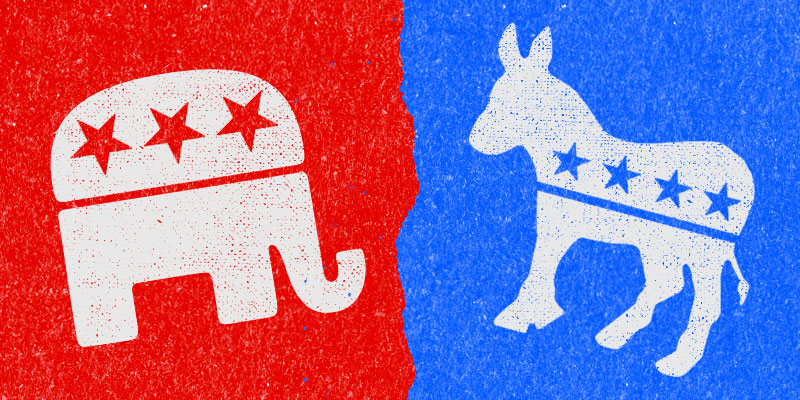
At no time since the Civil War began has our country seen this level of partisan tension. In a survey done in 1960, less than 10 percent of Americans said they would have a problem marrying someone from the other political party. In 2010 that number shot up to nearly 50 percent. Also, according to Shanto Iyengar, a professor of political science Stanford University, “In the 1950s and 1960s party affiliation made virtually no difference to interpersonal relations.” However, since the divisive 2016 election we are now seeing partisan tension dramatically affect our lives, From couples divorcing and friendships ending, to widespread boycotts and politically inspired acts of violence, D.C.’s political climate has undoubtedly created turmoil across the country.
The New York Times wrote an article entitled “Political Divide Splits Relationships – and Thanksgiving, Too.” In this article, family after family is ripped apart by the election. One daughter described in the article calls and forbids her parents from seeing their grandchildren ever again due to political differences. One man’s mother claims she, “no longer had a son.” While each family has their own unique history, there is one constant in each story listed in the article. In every case it was the Trump Supporter who was singled out and cut off from the rest of the family. In the article, the Times points out, “Democrats have dug in their heels, and in some cases are refusing to sit across the table from relatives who voted for President-elect Donald J. Trump.”
Trump supporters have not been completely free of political resentments either. During the election, many called their fellow supporters to boycott companies that didn’t align with their views. Macy’s was boycotted for not holding Trump’s clothing line. Oreos were boycotted when they moved their company to Mexico, and Ben & Jerry’s was singled out for supporting the Black Lives Matter movement. Personally, I could never boycott Ben & Jerry’s because their ice cream is just too delicious.
Democrats had their fair share of boycotts during the election as well. In Detroit, Democrats singled out Don Studvent, owner of the restaurant 1917, for catering a breakfast for Donald Trump, Jr. Though Studvent is a Clinton supporter and has signs supporting her outside his restaurant, he had only two tables filled during what he says was his busiest lunch hour. Studvent argues that the choice to cater for Donald Trump, Jr., was strictly business and that he “can’t take sides” when dealing with his business because he has employees to pay.
The politically inspired boycotts did not end on election night. One political activist group, the Democratic Coalition Against Trump, is attempting to sway the future of healthcare through boycotts. The group calls for the boycott of any restaurant that allows a Congress member who voted to repeal Obamacare to eat. Scott Dworkin, an adviser to group said, “Restaurants who don’t ban Members will be boycotted by D.C. residents and close down. We’ve done it before – It worked.”
While anecdotal, the above examples give a glimpse into the lack of civility in our country. In some instances, such political hostility has been known to evoke violence. For example, four teens tortured a mentally disabled teen (who supported Trump) on Facebook Live. Reportedly, the teens threatened the boy with a knife and forced him to drink toilet water. While incidents like this are rare , it is emblematic of the partisan tension that exists.
The solution to the problem of partisan tension isn’t that we all must agree with each other. Americans have always had a diversity of viewpoints on issues, and that is the mark of a free society. However, we cannot subscribe to the mindset that because someone has a different viewpoint that makes them not worthy of our respect or friendship. Many people come to their views honestly after they have given it much thought, and it is foolish for us to demand that people in our lives see the world as we do. Personally, some of the best friendships I have had were with people who didn’t believe virtually anything I did. But what was great about those friendships is that we actually challenged each other by listening to each other’s viewpoint.
There is so much we can learn from each other if we stop yelling and start listening. Listening doesn’t mean we compromise our principles or our faith but it does mean that we try to show respect to each other and demonstrate that even though we disagree we can still show that we care. I once heard a pastor say “No one cares what you say until they know that you care” and that is how we can heal partisan tension. If you really want to persuade people to your way of thinking ,first listen to what they have to say and show them you care, and I promise they will be much more open to what you have to say. Don’t miss out on quality friendships because of different worldviews, just treat people well whatever they believe, understanding that they may or may not come around to your point of view. We must remember that being a good friend is more important than being right, so let’s all do our part to show respect to each other and be part of the solution rather than part of the problem.
 Mr. Reid is general practice attorney in Birmingham Alabama. He has worked for Republican leadership in the United State House of Representatives in Washington, DC, and was a health policy advisor to the Governor of Alabama. You can contact him by email at [email protected] or by phone at 205-913-7406. A description of his practice areas is available at www.reidlawalabama.com.
Mr. Reid is general practice attorney in Birmingham Alabama. He has worked for Republican leadership in the United State House of Representatives in Washington, DC, and was a health policy advisor to the Governor of Alabama. You can contact him by email at [email protected] or by phone at 205-913-7406. A description of his practice areas is available at www.reidlawalabama.com.
Don’t miss out! Subscribe today to have Alabama’s leading headlines delivered to your inbox.